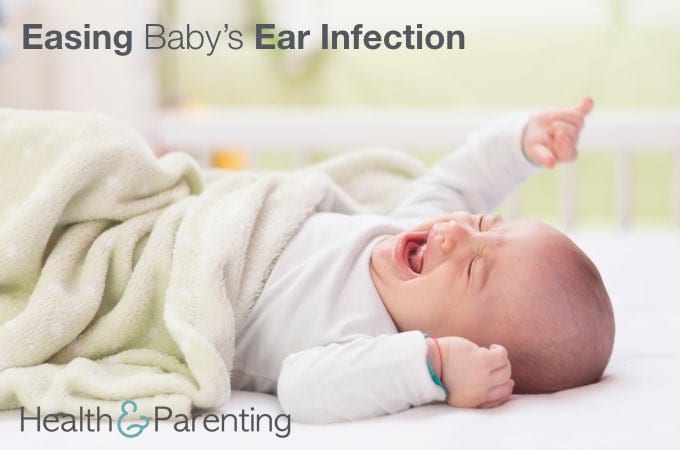You do everything you can to keep your baby healthy. But at some point, your little one may not feel well. One of the most common childhood illnesses is an ear infection. An ear infection is usually caused by a virus or bacteria that may lead to a backup of fluid in the middle ear.
The tube that connects your middle ear to the back of your throat and nose is the eustachian tube. Your baby’s eustachian tubes are shorter than an adult’s tubes and less steeply angled, which means fluid can get trapped in the middle ear. Ear infections are so common; it’s estimated that about 75 percent of babies will have at least one ear infection by the time they are two.
What often happens is your baby gets a cold, which causes an increase in mucus. The lining of the tubes become swollen and congested. The fluid remains in the tubes instead of draining, which can lead to an infection.
Since your little one cannot tell you what’s bothering them, it’s important to recognize signs of an ear infection. You may notice your baby is tugging or pulling at her ear. She may also cry when lying down or sucking due to increased pressure and pain in the middle ear. Yellow or white fluid may drain from your baby’s ear. Your baby may also have a loss of appetite and develop a fever.
Some babies also experience a temporary decrease in hearing. If your baby appears not to hear you, he’s not ignoring you. The swelling and pus in the ear may block sound. Once the infection has cleared, hearing should return to normal.
Treating Ear Infections
If you think your baby may have an ear infection, call your pediatrician. Your doctor will likely want to examine your baby and determine the best treatment. Although not all babies that have an ear infection require antibiotics, they may be prescribed in some cases.
Your doctor may also suggest over the counter medications to treat fever and make your baby more comfortable. Keep in mind, certain over the counter fever reducers, such as ibuprofen are not recommended for young babies. As always, only give your baby medications with your doctor’s approval.
Preventing Ear Infections
You may not always be able to prevent an ear infection, but there are a few things you can do to decrease the chances. For example, breastfeeding for at least six months helps provide your little one with the antibodies that builds her immune system and prevent infections.
If you bottle-feed, hold your baby in an upright position. Drinking his bottle lying down, may cause liquid to pool in the tubes. Keeping your baby free of secondhand smoke also decreases the risk of ear infections.
Written by MaryAnn DePietro @ writerlady34
This information is not intended to replace the advice of a trained medical doctor. Health & Parenting Ltd disclaims any liability for the decisions you make based on this information, which is provided to you on a general information basis only and not as a substitute for personalized medical advice. All contents copyright © Health & Parenting Ltd 2016. All rights reserved.










